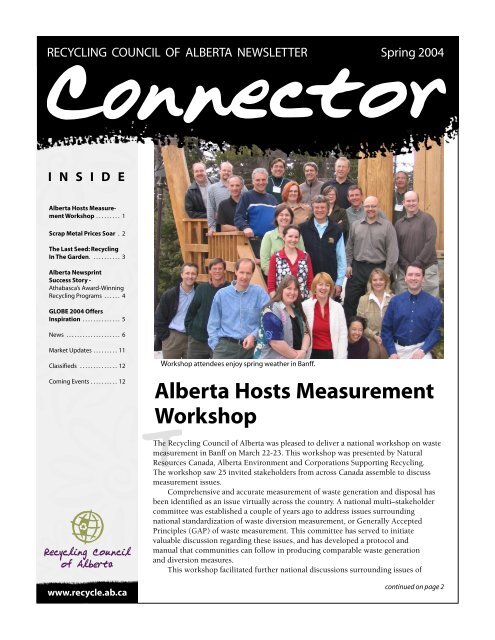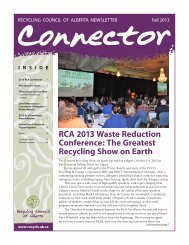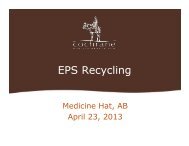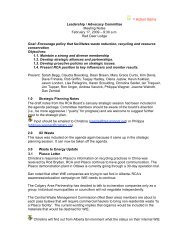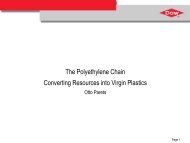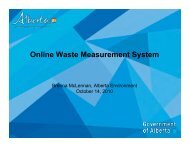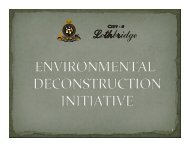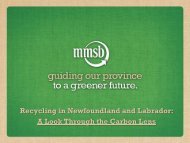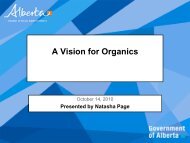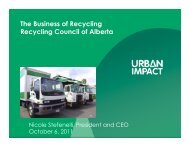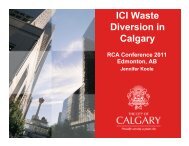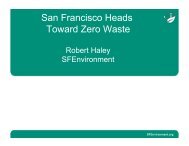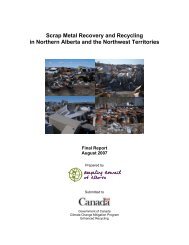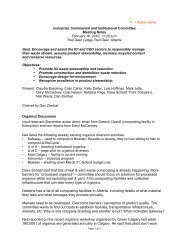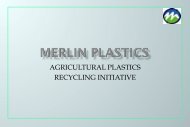Alberta Hosts Measurement Workshop - Recycling Council of Alberta
Alberta Hosts Measurement Workshop - Recycling Council of Alberta
Alberta Hosts Measurement Workshop - Recycling Council of Alberta
- No tags were found...
Create successful ePaper yourself
Turn your PDF publications into a flip-book with our unique Google optimized e-Paper software.
RECYCLING COUNCIL OF ALBERTA NEWSLETTER Spring 2004I N S I D E<strong>Alberta</strong> <strong>Hosts</strong> <strong>Measurement</strong><strong>Workshop</strong> . . . . . . . . . 1Scrap Metal Prices Soar . 2The Last Seed: <strong>Recycling</strong>In The Garden. . . . . . . . . . . 3<strong>Alberta</strong> NewsprintSuccess Story -Athabasca’s Award-Winning<strong>Recycling</strong> Programs . . . . . . 4GLOBE 2004 OffersInspiration . . . . . . . . . . . . . . 5News . . . . . . . . . . . . . . . . . . . . 6Market Updates . . . . . . . . . 11Classifieds . . . . . . . . . . . . . . 12Coming Events . . . . . . . . . . 12<strong>Workshop</strong> attendees enjoy spring weather in Banff.<strong>Alberta</strong> <strong>Hosts</strong> <strong>Measurement</strong><strong>Workshop</strong>The <strong>Recycling</strong> <strong>Council</strong> <strong>of</strong> <strong>Alberta</strong> was pleased to deliver a national workshop on wastemeasurement in Banff on March 22-23. This workshop was presented by NaturalResources Canada, <strong>Alberta</strong> Environment and Corporations Supporting <strong>Recycling</strong>.The workshop saw 25 invited stakeholders from across Canada assemble to discussmeasurement issues.Comprehensive and accurate measurement <strong>of</strong> waste generation and disposal hasbeen identified as an issue virtually across the country. A national multi–stakeholdercommittee was established a couple <strong>of</strong> years ago to address issues surroundingnational standardization <strong>of</strong> waste diversion measurement, or Generally AcceptedPrinciples (GAP) <strong>of</strong> waste measurement. This committee has served to initiatevaluable discussion regarding these issues, and has developed a protocol andmanual that communities can follow in producing comparable waste generationand diversion measures.This workshop facilitated further national discussions surrounding issues <strong>of</strong>www.recycle.ab.cacontinued on page 2
The Last Seed: <strong>Recycling</strong> in the GardenNature is regaining a foothold in urban environments,reclamation sites and parks, thanks to native plantnurseries that are finding their niche in <strong>Alberta</strong>. Collectingmaterial from wild or particular sites, then propagating,growing and hand picking select seed, growers haveaccumulated a living database <strong>of</strong> historic <strong>Alberta</strong>vegetation. At this time <strong>of</strong> year we all have the option <strong>of</strong>sowing our yards and gardens with commercial materialsthat will likely require much maintenance and bear sterileseed in maturity. However, we can also look at options thatrequire little upkeep, are drought resistant, recycle theirseed, and will even provide food for us by mid–summer!Living in the woods last year, I was surprised by allthe edibles identified, even with my meager botanicalknowledge. From July through August I dined onsaskatoon, silverberry, buffalo berry, chokecherry, rosehips,wild celery, and a multitude <strong>of</strong> other wild vegetation thatbegged just a wee taste. However, making my way back tocity living this spring, I was left wanting the maintenancefreeabundance that nature had provided. A recent visit toBow Point Nursery just outside <strong>of</strong> Calgary proved that awide variety <strong>of</strong> plants including willows, sages, currants,yuccas, pines, larch, wild rose, grasses, sunflower andmuch more, were available and viable in an urban setting.With a distinct lack <strong>of</strong> precipitation over the winter,neighboring nurseries and farms will be irrigatingintensively to keep up with the arid climate. Bow Pointon the other hand, requires no irrigation at all on droughttolerant, mature native plants. For seedlings, wateris collected in a 12,000L cistern from snowmelt andrainwater from several nearby ro<strong>of</strong>tops. The seedlingsare watered from the roots up, by flooding a shallow poolcontaining the closely spaced pots. Excess water drainsfrom the pool, runs through gravel and sand filters, and isrecycled to the cistern.Placing a rain barrel at each <strong>of</strong> your downspoutscan similarly provide enough water to get your nativelandscape well on its way. Come spring, your “lawn”could come alive with crocuses, old man’s whiskers, and acover <strong>of</strong> fescue or strawberry that would need no cuttingor supplemental water for the remainder <strong>of</strong> the summer!Imagine: you would not need to use precious drinkingwater to sprinkle your turf. The time, electricity, or gasused to run a conventional lawnmower would be a thing<strong>of</strong> the past – you would not even need a lawnmower!An added advantage to native species, saysKen Wright <strong>of</strong> Bow Point, is that many wild species havebeautiful stems that are attractive even when bare – whichPaul Kelly and his fiance Clare Stoeckle enjoying a sunnyspring day out by the tipi.in <strong>Alberta</strong> is about 75% <strong>of</strong> the year. Yellow, gold, and tanhues <strong>of</strong> willow obtained from varying species in the areapresent a colorful palette even in the middle <strong>of</strong> February.The deep red <strong>of</strong> local dogwood brightens up the woodsas well as a dreary winter yard. Native species alsocompete well with nuisance weeds and imported plants,making it very easy for them to establish themselvesonce re-introduced.Help nature make its way back into the urbanenvironment, starting with your back yard!For information on how you can make your businessor domestic landscape pesticide-free and ecologicallyfriendly, visit www.sierraclub.ca. For local sources <strong>of</strong>native seeds and seedlings, look at the listings under the<strong>Alberta</strong> Native Plant <strong>Council</strong> www.anpc.ab.caPaul Kelly3SPRING 2004
Athabasca’s Award-Winning Rural<strong>Recycling</strong> ProgramsSPRING 2004The Athabasca Regional Waste Management ServicesCommission (ARWMSC), a collaboration <strong>of</strong> the County<strong>of</strong> Athabasca, Town <strong>of</strong> Athabasca and the easternportion <strong>of</strong> the MD <strong>of</strong> Lesser Slave River (Smith andFlatbush), have stepped up to the rural recycling andwaste management challenge. By working together, thecommission members, after many years <strong>of</strong> planning,have put in place a regional waste system that includesa Class II C Landfill, six full–service Rural Transfer Sitesand a Recycle Processing Facility.All this, plus the ARWMSC’s additional services,namely: Residential Garbage Pick-Up (Athabascaand the Village <strong>of</strong> Boyle), Commercial CardboardPick-Up, Residential and Commercial Blue Box Pick-Up, and Contract Landfill Operating (Boyle Landfill),are an excellent example <strong>of</strong> how communities canmake “city-style” recycling programs a reality even inwidespread rural areas.Along with the facilities owned and operatedby the Commission, long–term partnerships withsupporting organizations were established. Blue HeronVocational Training owns and operates a Bottle Depotalongside the Recycle Processing Facility in Athabasca.By partnering up, a one-stop recycling location wascreated. Labour from Blue Heron is in turn contracted toassist in operations at the Transfer Sites and the RecycleFacility, providing jobs and training for individuals withdevelopmental disabilities.The Commission has sub-contracted the services <strong>of</strong>Dr. Recycle for the pick-up <strong>of</strong> Blue Box materials fromthe Village <strong>of</strong> Boyle commercial businesses and Town <strong>of</strong>Athabasca residents.The Village<strong>of</strong> Boyle haspartnered withARWMSC inmany ways. TheVillage implemented a Residential Blue Box <strong>Recycling</strong>Program <strong>of</strong> which all materials collected by Dr. Recycleare delivered to the ARWMSC Recycle Facility forprocessing. Boyle and the surrounding summer villagesentered into an operational contract with ARWMSCfor the operation <strong>of</strong> the Boyle Landfill. The Village<strong>of</strong> Boyle and the Town <strong>of</strong> Athabasca regionalizedresidential garbage pick-up, a new service <strong>of</strong>fered bythe Commission.Through memberships and affiliations with the<strong>Recycling</strong> <strong>Council</strong> <strong>of</strong> <strong>Alberta</strong>, <strong>Alberta</strong> Environment,Northern CARE and many other recycling associations,the ARWMSC keeps up–to–date on recycling and wastemanagement issues. In 2003, ARWMSC was awarded theRCA’s Rural <strong>Recycling</strong> Rs <strong>of</strong> Excellence Award.The Commission collects, processes and ships thefollowing materials to end use processors:• Cardboard, Newspaper, Office Paper, Magazines,Phone Books & Mixed Paper• Plastic Milk Jugs & Milk Cartons• All Plastic Bottles• All Plastic Tubs and Pails• Plastic Bags• Agricultural Pesticide Containers• Agricultural Silage Film & Bale Wrap• Used Oil, Used Oil Containers & Used Oil Filters• Clear Glass• Tin Cans• Scrap Metals• Burnable Materials• Automotive Batteries• Ni-Cad Batteries• Fluorescent Light Tubes• Computers, Televisions & other ElectronicsSince the landfill is situated a great distance away fromthe central areas, recycling and composting are a highpriority for ARWMSC. One <strong>of</strong> the major future plans forthe Commission is to provide a centralized compostingfacility for the area and continue to remove as manyrecyclable materials from the waste stream as possible. •4Do you have a Waste Reduction Success Story? Submit details on your successfull business ormunicipal program to info@recycle.ab.ca, fax 403.843.4156 or phone 403.843.6563 for further details.
GLOBE 2004 Offers InspirationI traveled to Globe this year without great expectations,instead anticipating the same old rhetoric from thisstrongly business-oriented conference. One <strong>of</strong> thegood things about low expectations is that they can beexceeded in startling fashion. This was certainly the casewith Globe 2004.The opening plenary demonstrated the strongregistration at this year’s conference, with the huge roomliterally bulging at the seams with delegates from aroundthe world. Plenary speakers were not the inspiring ones,however, tending more towards canned political speechesor corporate advertorials from large sponsors.Inspiration was to be had in spades at this event,however, for those willing to seek it out. I was completelythrilled to be able to experience William McDonough intwo separate sessions. One <strong>of</strong> the sessions also includedMichael Braungart, chemist and Bill’s business partner.The message presented very eloquently by WilliamMcDonough is anything but same-old, same-old. Anarchitect by training, Bill approaches problems as designfailures, and sees the need for innovative solutions asa design challenge. This approach is summed up in hisproposed mission statement for the planet: We strivetoward a delightful, safe and healthy world, with cleanwater and renewable power, economically, equitably,ecologically and elegantly enjoyed. Not surprisingly,Bill has not found anyone who disagrees with thisfundamental goal. So far, so good – now we just need toagree on how to get there.Bill’s basic premise is that we need to pursue ecoeffectiveness,rather than eco-efficiency. Nature isthe model for this approach. Nature does not work tominimize, but rather ensures that all materials andprocesses work within natural cycles. Forexample, all energy utilized in naturalsystems is by definition renewable,and natural systems do not accumulatepersistent toxic substances.To follow this model, Bill proposesthat all materials be part <strong>of</strong> either anatural or technical nutrient cycle. Allconsumable items would be naturalnutrients, therefore any excess or wasteproduct is completely biodegradable,allowing it to be managed in a compostingsystem and returned to the earth as anutrient. Durable items, on the otherhand, could be technical nutrients thatwould be part <strong>of</strong> an ongoing closed-looprecycling system that would recycle thematerials an unlimited number <strong>of</strong> times.This approach would allow us to abandonthe standard approach <strong>of</strong> reducingunwanted waste, instead eliminating theby Christina Seidelentire concept <strong>of</strong> waste.One <strong>of</strong> the most strikingimplications <strong>of</strong> an eco-effectiveapproach is that it can beembraced by the businesssector. The corporate worldin general has not embracedwaste reduction andeco-efficiency, largely becausereducing production and consumption is not in its bestinterest. However, business is more likely to endorseeco-effectiveness, since it does not necessarily requirereduced production. This may be a win-win scenario,since the innovation <strong>of</strong> business will be required to movedown the eco-effectiveness path.The potential for business to be part <strong>of</strong> the solution isnever more evident than when listening to Ray Anderson,the famous “born-again environmentalist” CEO <strong>of</strong>Interface Carpets. Ray was part <strong>of</strong> a CEO ArmchairDialogue session, and his honest conviction to theenvironment and ensuring that his corporation adoptsa strategy <strong>of</strong> sustainability is a powerful example forother private sector leaders. Ray’s story is particularlypowerful because he was not always concerned about theenvironment, but rather had a personal epiphany a fewyears ago as a direct result <strong>of</strong> customer inquiries about theenvironmental performance <strong>of</strong> his company.To paraphrase William McDonough, “Why do wewant to be less bad, if we can change and be good?”.Simple words to sum up a simple conceptual shiftin our way <strong>of</strong> looking at the world that could have apowerful impact on our future sustainability on thisplanet we call home.5SPRING 2004
E-WASTE NEWS<strong>Alberta</strong>ns Eager to Recycle E-WasteResults <strong>of</strong> workshops with stakeholders and anon-line consultation with <strong>Alberta</strong>ns, released February 11,show there is both a need and a desire to establish aformal, province–wide program to recycle and manageelectronic waste.Over 118 stakeholders – from municipalities torepresentatives from the electronics industry – participatedin six workshops across the province in November andDecember 2003 and provided comments in relation to aproposed program. Overall, stakeholders strongly supportestablishing a program and• 94% agreed an environmental fee should be charged• 95% agreed that reasonable access to collection points isimportant if the program is going to be effectiveJust over 200 <strong>Alberta</strong>ns responded to the on-line survey,held in December 2003, and 96% <strong>of</strong> respondents indicatedtheir support for an electronics recycling program. Theworkshops and survey were part <strong>of</strong> a consultation processto help shape <strong>Alberta</strong>’s proposed electronics recyclingprogram, scheduled to be announced this spring.Arrangements would be made to collect oldelectronics from communities, similar to other successful<strong>Alberta</strong> recycling programs for products such as tires andused oil. When the program is introduced, <strong>Alberta</strong> will bethe first province in Canada to establish a formal programfor electronics recycling. The program is a key part <strong>of</strong>the strategy to achieve the province’s goal <strong>of</strong> reducing theannual per capita waste going to landfills from the currentlevel <strong>of</strong> 750 kg per person to 500 kg by 2010.Summaries <strong>of</strong> both the on-line and stakeholderconsultations are available on-line atwww.gov.ab.ca/env/waste. For further information, contactVal Mellesmoen at (780) 427-6267 (outside <strong>of</strong> Edmonton,dial 310-0000 for toll-free connection).<strong>Recycling</strong> Consultations Initiated inSaskatchewanConsultations are set to begin on the possibility <strong>of</strong>establishing two new province-wide recycling programs:one to recycle old electronic equipment and the other tohandle unwanted paint. “We want to know what people inthe industry as well as consumers have to say about thesepotential new programs.”, SK Environment Minister DavidForbes said.Saskatchewan Environment is proposing a systemfor both projects based on the industry-led stewardshipmodels similar to the province’s Scrap Tire ManagementProgram and the Used Oil <strong>Recycling</strong> Program. Regulationswould require industry related to the designated electronicequipment and paint to manage and operate recyclingprograms on a non-pr<strong>of</strong>it basis. Stakeholder groupsare being mailed fact sheets and are invited to providecomments. Members <strong>of</strong> the public can access that sameinformation on the Saskatchewan Environment website atwww.se.gov.sk.ca or by calling: 1-800-567-4224 toll free inSaskatchewan.For more information, contact: Victor Chang,Environment, Regina, Phone: (306) 787-6185,vchang@serm.gov.sk.caSPRING 20046Cell Phones Accepted at Grande PrairieE-Waste DepotAquatera Utilitie’s E-Waste Depot now acceptscell phones for no charge from everyone (commercial,non-resident, resident). Most cell phones are included,however, home phones or the old “bag” phones are not.Aquatera will donate $1 for every cell phone collectedto a local children’s charity (Kev’s Kids) and is hoping thatthis will further encourage people to bring in their oldphones.For more information contact Michelle Lange at(780) 538-0452 or mllange@aquatera.ca.
Electronics Manufacturers Agree to Fund<strong>Recycling</strong>A group <strong>of</strong> electronics manufacturers, includingDell Computer Corp., Epson America Inc. and Hewlett-Packard Co., tentatively has agreed to develop and fund anational recycling system, after several years <strong>of</strong> meetingswith environmental groups and state governments.The agreement came Feb. 11 at what was supposed tobe the last meeting <strong>of</strong> the National Electronics ProductStewardship Initiative, in Portland, OR. However,the Electronic Industries Alliance, a trade group,said the industry still has to resolve divergent viewsamong companies.EIA, based in Arlington, VA, said industryrepresentatives will meet again to develop proposedfederal legislation that would finance recycling, eitherthrough a fee at the point <strong>of</strong> sale or alternative plansthat would let companies manage the costs withoutexternal fees. “EIA is optimistic that, in time, industrymanufacturers will be able to reach a consensus on theissue <strong>of</strong> financing, “ said Heather Bowman, EIA director <strong>of</strong>environmental affairs.Environmental groups participating in NEPSI saidthat industry has yet to present a practical financing plan,and that some proposals thus far would pass on significantcosts to local governments.Source: Plastics NewsDell To Recycle Computers For EPADell Inc., the world’s largest personal-computermaker, will recycle computers for the U.S. EnvironmentalProtection Agency after being criticized last year for thecompany’s environmental practices. Dell will recyclecomputer systems that are being replaced by the EPAas the agency leases as many as 10,000 Dell desktop,notebook and server computers over the next three years.The Silicon Valley Toxics Coalition, an environmentalgroup, last year criticized Dell’s recycling program forusing prison labor and not adequately recycling parts. Afew weeks after the criticism, Dell overhauled the programto reduce prices for recycling and dismissed a governmentorganization that supplied prison workers for recycling.Source: RCO Highlights the HeadlinesCalgary announces eCycle Roundup 2004The City <strong>of</strong> Calgary and Maxus Technology arepartnering again this year for a one-day eWaste Roundup.On May 8th, between 9:00 am and 3:00 pm, Calgarianscan bring in personal electronic waste to one <strong>of</strong> the threecollection stations to be set up for that day. Offices andbusinesses are not permitted to use this event to drop <strong>of</strong>ftheir equipment, however, they are encouraged to contactMaxus directly to arrange for recycling.For more information contact Wil Ha, City <strong>of</strong>Calgary Waste & <strong>Recycling</strong> Services, at 403.230.6632 orClayton Miller, Maxus Technology, at 403.769.3231.7SPRING 2004
SPRING 20048CANADIAN NEWSME first! Program LaunchedA total <strong>of</strong> $4.3 million dollars in interest-free loansis being provided to seven <strong>Alberta</strong> municipalities to helpachieve energy savings in their operations. Their projectsare the first to be approved under the Municipal Energyefficiency assistance program “ME first!”, launched inSeptember 2003 by by <strong>Alberta</strong> Municipal Affairs and<strong>Alberta</strong> Environment.The seven municipalities receiving ME first!interest-free loans are:• Edmonton – $2.5 million to retr<strong>of</strong>it traffic signals withenergy saving light-emitting diode (LED) lamps.• Spruce Grove – $700,000 to reduce energy consumptionby 35% in a 25-year-old municipal building.• Fort Saskatchewan – $459,235 to retr<strong>of</strong>it the city’saquatic facilities for greater energy savings.• Drumheller – $262,100 to increase automation at thewater treatment plant by replacing/upgrading processcontrols and control systems.• Peace River – $218,400 for energy saving upgrades tothe administration building.• Chestermere – $130,970 to increase energy savings inthe new municipal <strong>of</strong>fice building.• Redwater – $76,020 to install new lighting and low-Eceilings in the community’s recreation centre.Over the next four years, ME first! will provide up to$100 million in interest-free loans to support municipalinitiatives that improve energy savings. Deadline for thenext round <strong>of</strong> applications is June 1, 2004. For moredetails visit www.municipalaffairs.gov.ab.ca.Bag Limit Option For TorontoA proposal to charge Torontonians for putting out toomany garbage bags will be among the options includedin a report prepared by city staff on reaching the city’swaste diversion goals. Under such a plan, householdswould be allowed two or three bags for regular pickup.After that, each bag would cost $1. Similar proposals havebeen roundly defeated by city council in the past, andBarry Gutteridge, the city’s commissioner <strong>of</strong> works andemergency services, acknowledged that it is bound to becontroversial. But he said the “trial-balloon report” willnot recommend charging for extra bags – only suggest itas one option among many. The report, which he will sign,has not yet been written, and is supposed to be deliveredto the works committee by May.Source: RCO Highlights the HeadlinesNorskeCanada’s Recovered Paper Suppliers <strong>of</strong>the YearNorskeCanada’s Paper <strong>Recycling</strong> Division named theCity <strong>of</strong> Vancouver and Canadian Fibre its 2003 suppliers<strong>of</strong> the year for recovered paper.The City <strong>of</strong> Vancouver’s blue box and apartmentrecycling programs collect about 11.7 million kg <strong>of</strong> oldnewspapers every year which Canadian Fibre sends toNorskeCanada’s recycling facility in Coquitlam. The awardrecipients were chosen for their ongoing cooperation inproviding quality recovered newspapers, magazines andtelephone directories through efficient service and withreliability and flexibility in shipping performance.According to Doug McLeod, Purchasing &Transportation Director at NorskeCanada, the recyclingrate for old newspapers in BC is now up to 70%, showinga steep incline compared to 1991’s 40%.NorskeCanada’s Coquitlam paper recycling facilityis the largest in Western Canada. Old newspapers arede-inked, pulped and used by NorskeCanada’s mills tomanufacture new paper products.For more information contact Doug McLeod at(604) 527-2388.Cleanit Greenit Shows Business PromiseCleanit Greenit Composting System Inc. is one <strong>of</strong>seven finalists in the VenturePrize contest, the secondannual Greater Edmonton business plan competition. Thestart-up company chosen ultimately as having the mostpromising business plan will be awarded a grand prize <strong>of</strong>$100,000.Source: Edmonton JournalCloverbar Landfill Gas UtilizationEPCOR Power Development Corporation isproposing to construct and operate a 4.8 megawattlandfill gas-fired generation facility at the Cloverbarlandfill in Edmonton. Methane gas would be collected,purified and used to generate electricity. Utilizing the gasdisplaces conventional, non-renewable fuels such as coaland natural gas, reducing greenhouse gas emissions. Theproposed generating station would generate electricity forapproximately 5,000 homes.Ontario Looks to 60 PercentThe Ontario government wants to see 60% <strong>of</strong> wastematerials recovered by 2008. Ontario EnvironmentMinister Leona Dombrowsky is seeking advice fromaffected parties on how to push recovery and utilizationrates upward. Among ideas being discussed are addingnew materials to local program collection lists, openingcentralized composting operations and developing newmarkets for recyclables.Source: Resource <strong>Recycling</strong>’s The Latest <strong>Recycling</strong> News
Having Your Voice Heard: The EnvironmentalPetitions ProcessThe environmental petitions process is a formalprocedure for Canadians to bring their concerns aboutenvironmental issues to the attention <strong>of</strong> the federalgovernment and obtain a response to those concerns.Unlike traditional petitions that require numeroussignatures, an environmental petition needs only asimple letter. An individual, organization, municipality,or corporation can initiate a petition, but it must be donein writing. Petitions are sent to the Auditor General <strong>of</strong>Canada, and the Commissioner, on behalf <strong>of</strong> the AuditorGeneral, who forwards them to the appropriate ministersand monitors their responses. Petitions must address an“environmental matter within the context <strong>of</strong> sustainabledevelopment.” When a petition is made, governmentministers are compelled to respond within 120 days. Fora complete listing <strong>of</strong> the federal departments or for moreinformation on submitting a petition, please contactthe Auditor General <strong>of</strong> Canada at (613) 995-3708 orpetitions@oag-bvg.gc.ca or visit http://www.oag-bvg.gc.ca/domino/cesd_cedd.nsf/html/menu7_e.htmlSource: CEN Weekly E-BulletinPEI Farmers Seek Government Aid for PotatoCompostingBlaming the recent popularity <strong>of</strong> low-carb diets, PEIfarmers are warning <strong>of</strong> an environmental catastropheunless millions <strong>of</strong> pounds <strong>of</strong> unsold potatoes arecomposted. The National Farmers Union is calling fora $20 million loan from the provincial government tohelp Island growers to compost between 3.5 million to6 million hundred-weight <strong>of</strong> spuds before spring.Failing composting, the potatoes will have to bedumped, risking contamination <strong>of</strong> groundwater and thespread <strong>of</strong> disease to neighbouring crops. The loan wouldpay growers about 3.5 cents a pound for their potatoesand help cover mounting debts. The last major potatocomposting effort was carried out in 2000, when thediscovery <strong>of</strong> potato wart fungus led to the loss <strong>of</strong> US andoverseas markets. Millions <strong>of</strong> hundredweight worth <strong>of</strong>potatoes were safely disposed <strong>of</strong> without damage to theenvironment.Source: <strong>Recycling</strong> Canada Mountains <strong>of</strong> Opportunity2004 RCA Fall ConferenceOctober 6-8, 2004, Jasper Park LodgeWatch www.recycle.ab.cafor program updates.9SPRING 2004
INTERNATIONAL NEWSMichigan Toughens Rules on GarbageImportsMichigan’s governor is expected to sign a package<strong>of</strong> bills today aimed at placing new restrictions oncontroversial waste shipments. The signing is to take placeat the Michigan dump where Toronto sends its garbage,but Angelos Bacopoulos, the city’s general manager <strong>of</strong>solid waste management, said he does not think thenew rules will have a major effect. They are intended toensure that incoming waste meets or exceeds Michigan’sstandards and does not include yard waste or bottles andcans subject to the state’s deposit law. The state’s wasteindustry is expected to challenge the laws.Source: RCO Highlights the HeadlinesBiodegradable Packaging FilmsBiodegradable alternatives to polyethylene filmsand bags, plus performance characteristics superior toLDPE and HDPE, are the way that Cortec Corporationdescribe their Eco Film and Eco Works products. Madefrom biobased raw material, the products can convertcompletely to carbon dioxide and water after the end <strong>of</strong>their useful life.For more information visit www.cortecvci.com.Source: BioCycleSPRING 2004UK Supermarkets Urged to Cut DownPackaging WasteA new report has called for supermarkets to limitpackaging waste, do more to promote recycling and cutdown on pollution caused by long distance distribution.Billions <strong>of</strong> plastic bags are used up every year, and theaverage UK household now spends £470 a year onpackaging – one-sixth <strong>of</strong> its total food budget. The report,called ‘How Green is Your Supermarket’, was compiledby Liberal Democrat MP Norman Baker. It focused on thenine leading UK supermarkets – Tesco, Asda, Sainsbury,Safeway, Morrisons, Somerfield, Co-op, Marks & Spencerand Waitrose. Using data supplied by the supermarketsthemselves, the study sought to establish just how muchwaste and pollution is being generated by the food sector,to what extent local sourcing is being used and how muchenergy is being consumed.Source: RCO Highlights the Headlines10
<strong>Recycling</strong> Fines Levied in U.K.Compulsory recycling regimes could see peoplebeing hit with fines <strong>of</strong> up to £1,000 if they fail to sort outtheir rubbish. Squads <strong>of</strong> bin snoops will be sent round tomake sure residents are doing their duty in a pilot schemelaunched on 25,000 homes in the North London borough<strong>of</strong> Barnet. A team <strong>of</strong> “recycling assistants” can orderresidents to sift through trash and give advice on the types<strong>of</strong> rubbish collected. Compulsory recycling is predicted tospread across the country as more councils strive to meettheir targets.Source: RCO Highlights the HeadlinesGlobal Wind Power Capacity On The RiseThe global wind power industry installed8,133 megawatts <strong>of</strong> capacity last year, dominated bythe US and Europe, according to figures released by theAmerican Wind Energy Association and the EuropeanWind Energy Association. The United States andEurope accounted for 88% <strong>of</strong> new installations. The8,133 megawatts <strong>of</strong> new capacity cost about $9 billion.The world´s total wind power generating capacity is now39,294 megawatts, according to the report.Source: RCO Highlights the HeadlinesCompostable Carpet Made From CornInterface, a large environmentally progressivemanufacturer <strong>of</strong> commercial carpet tiles, announced aresidential line <strong>of</strong> floor covering called “InterfaceFLOR”.The new “Spring Planting” tiles, made with Ingeo, anew Cargill Dow fiber synthesized from polylactic acidderived from corn, can be recycled and composted in acommercial facility.For more information, visit www.interfaceflor.com orcall 1-866-281-FLOR.Source: BioCycleNaples Buried in RefuseThe streets <strong>of</strong> Naples and other towns aroundItaly’s third-largest city are literally buried in trash, withthousands <strong>of</strong> tonnes <strong>of</strong> foul-smelling refuse piled due toa lack <strong>of</strong> space at reprocessing centers. Angry residents<strong>of</strong> the town <strong>of</strong> Bagnoli erected blockades in an effortto keep municipal authorities from converting localwarehouses to temporary trash depots. In the town <strong>of</strong>Aversa, some 1,300-1,400 tonnes <strong>of</strong> trash cover the street,and comparable amounts have been left out in other areasas well. Schools and open-air markets had to be shut inseveral towns as a health measure.Source: RCO Highlights the HeadlinesToyota Endorses Nylon <strong>Recycling</strong> SystemToyota Motor Corp. has taken another step toward itsgoal <strong>of</strong> achieving zero landfill waste at all <strong>of</strong> its assemblyplants by endorsing DuPont’s Composite <strong>Recycling</strong>Technology to reclaim and reuse nylon 6 from engineintake manifolds. Test results showed that manifolds madefrom 100% recycled content met specifications for leaks,bursting and breaking strength. Toyota plans to adopt theclosed-loop Composite <strong>Recycling</strong> Technology to reclaimnylon 6 from air intake manifolds and says it currentlyrecycles 88% <strong>of</strong> its vehicles and is developing recyclingstrategies to increase that rate to 95% by 2015.Source: RCO Highlights the Headlineswww.recycle.ab.caVisit the <strong>Recycling</strong> <strong>Council</strong> <strong>of</strong><strong>Alberta</strong>’s new website and enjoy thenew user-friendly navigation andre-designed look.Thank you to Merlin Plastics for sponsoringthe RCA’s new website.Per Tonne TrendGlassColoured 0 nFlint 10.00 per ton nPlate 10.00 per ton nPaperCardboard (baled) 50 - 75 iCardboard (loose) 20 - 50 iOffice Pak (loose) 55 - 80 iMixed (loose) 0 - 10 nMagazines (loose) 0 - 20 nNews (loose) 40 - 80 iPlastic (HDPE)Natural (baled) 170 iColoured (baled) 60 iMetalSteel Food Cans 20 nWhite Goods 60 hSPRING 2004Prices reflect surveyed averages (F.O.B. buyer) at the time <strong>of</strong> publishing and are subject tomarket fluctuations. Individual prices may vary according to material quality, volumes andcontractual arrangements. Please contact your buyer to update prices at time <strong>of</strong> shipping.11
SPRING 2004122004 Annual Convention and Scrap <strong>Recycling</strong>Industry Expo, presented by the Institute <strong>of</strong> Scrap<strong>Recycling</strong> Industries, April 25-29, 2004, Las Vegas, NV,contact: 919.563.52918 th Canadian Pollution Prevention Roundtable,April 28-29, 2004, Ottawa, ON; contact: 519.337.3425,www.c2p2online.com/CPPR“Lord <strong>of</strong> the Rings” <strong>Recycling</strong> <strong>Council</strong> <strong>of</strong> Ontario 24 thannual Conference and Golf Tournament, May 4 - 6, 2004,Markham, ON; contact: 416.657.2797 Ext. 4,tracysak@rogers.comCANECT 2004 - 6 th Annual Canadian EnvironmentalConference & Trade Show, May 12-13, 2004, Toronto, ON;contact: 1-888-254-8769People and the Planet: Changing Values for aSustainable Future, held at Southern <strong>Alberta</strong> Institute forTechnology (SAIT), May 14-16, 2004, Calgary, AB; contact:1-888-810-4204, peopleandtheplanet@ca.inter.netCanadian Association <strong>of</strong> <strong>Recycling</strong> Industries 63 rdAnnual General Meeting, Convention and Exhibition,June 5-7, 2004, Victoria, BC; contact: 905.426.9313“Wild Wild Waste” 2004 Conference for the CanadianPrairie Chapter <strong>of</strong> the Solid Waste Association <strong>of</strong> NorthAmerica (SWANA), June 8-11, 2004, Calgary, AB;contact: 403.230.6631, SWANAconference@calgary.ca“Tourism, Making it a Sustainable Resource”<strong>Recycling</strong> <strong>Council</strong> <strong>of</strong> British Columbia 2004 Conference,June 9-11, 2004, Whistler, BC; contact: 604.683.6009,events@rcbc.bc.ca2004 Paper <strong>Recycling</strong> Conference & Trade Show,June 27-29, 2004, Atlanta, GA; contact: -800-456-0707www.paperrecyclingconference.comNorthern CARE’s 5 th Annual <strong>Recycling</strong> Conference,Quality Hotel and Conference Centre, September 8-10, 2004,Grande Prairie, AB; contact: 780.980.0035, executivedirector@northerncare.orgBe Resourceful... Compost!, 14 th Annual NationalComposting <strong>Council</strong> <strong>of</strong> Canada Conference, Exhibits &General Meeting, September 15-17, 2004, Gatineau, QC;contact: 416.535.0240, ccc@compost.org“Mountains <strong>of</strong> Opportunity” 2004 <strong>Recycling</strong> <strong>Council</strong><strong>of</strong> <strong>Alberta</strong> Fall Conference and AGM, Jasper Park Lodge;October 6-8, 2004; Jasper, AB; contact: 403.843.6563,info@recycle.ab.caWaste Reduction Week in Canada, October 18-24, 2004;www.wrwcanada.comE-Scrap 2004, North American Electronics <strong>Recycling</strong>Conference, October 19-20, 2004, Minneapolis, MN;www.e-scrapnews.comRubber <strong>Recycling</strong> 2004 “New Frontiers in Tire<strong>Recycling</strong>”, Rubber Association <strong>of</strong> Canada Conference,October 20-22, 2004, Banff, AB; contact: 904.814.1714,www.rubberassociation.ca2005 <strong>Recycling</strong> <strong>Council</strong> <strong>of</strong> <strong>Alberta</strong> Fall Conference& AGM, Chateau Lake Louise - A joint event with theComposting <strong>Council</strong> <strong>of</strong> Canada’s Conference in <strong>Alberta</strong>’sCentennial Year, October 12-14, 2005, Lake Louise, AB;contact: 403.834.6563, info@recycle.ab.caJobs• Executive Director for Clean Nova ScotiaClean Nova Scotia is seeking an Executive Director.They are a non-pr<strong>of</strong>it, environmental educationorganization. The successful candidate will havemanagement experience, a strategic perspective anddemonstrated success in turning vision into reality.You are knowledgeable about environmental issuesand compelling in the role <strong>of</strong> chief spokesperson. Theremuneration package includes a competitive salaryand benefits. A full job description is available atwww.clean.ns.ca.Deadline for receipt <strong>of</strong> applications isApril 30, 2004 at 4:30 pm. Please send resumesby email to dhawkins@clean.ns.ca, or mail toExecutive Director Job, Clean Nova Scotia, 126 PortlandStreet, Dartmouth, Nova Scotia, B2Y 1H8.Business Opportunity• Hanna Open for <strong>Recycling</strong> BusinessIf you or your company is looking for a place to setup shop for your recycling endeavors, then look n<strong>of</strong>urther than Hanna, AB. We have what you need,from land to easy access transportation, and, mostimportantly, extremely motivated people to makeyour business succeed. If you are interested in seeingwhat the Town <strong>of</strong> Hanna can do for you, then callRon Lowther, Big Country Regional <strong>Recycling</strong> Society,at 403.854.3308 or 403.854.3743.To place a free listing in the classifieds section, RCA members cancontact 403.843.6563


